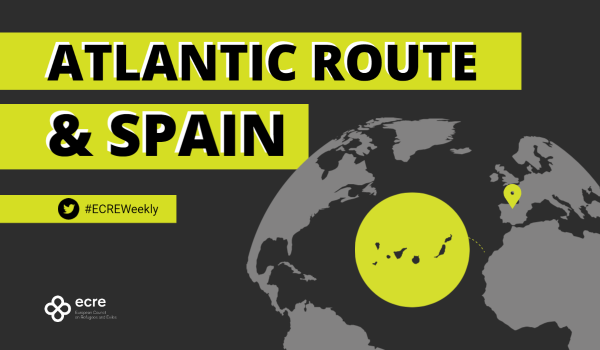- The Spanish government has asked the European Border and Coast Guard Agency (Frontex) to try to secure permission to patrol the coasts of several West African countries in order to support the latter’s own migration management efforts.
- The European Commission has announced that it will allocate € 30 million to discourage people in Senegal from attempting to travel to Europe.
- Spanish Prime Minister Pedro Sánchez has expressed his “total rejection” of the establishment of migrant detention centres outside the EU as his government finalises draft legislation aimed at regularising the status of hundreds of thousands of people living in an irregular situation in the country.
- The Portuguese government has announced its willingness to welcome people to Portugal but only under strict conditions.
- More than 230 people, including 13 women and 58 children, have been rescued from a single boat in the Canary Islands.
The Spanish government has asked the European Border and Coast Guard Agency (Frontex) to try to secure permission to patrol the coasts of several West African countries in order to support the latter’s own migration management efforts. During a meeting of the EU’s Justice and Home Affairs Council on 10 October, Spanish Minister of the Interior Fernando Grande-Marlaska told his colleagues: “It is particularly important to improve [Frontex’s] capacity to act abroad, both in terms of return and border management”. He also reminded them that Frontex had been active in the region in 2006 and that it should ask Mauritania, Senegal and the Gambia, the main countries of departure for people who attempt to reach the Canary Islands, for permission to patrol their coasts. “The co-operation that the EU has been able to develop with the candidate countries or with those of the Mediterranean should also be extended to our African partners in the Atlantic, with a comprehensive approach,” he said.
The European Commission has announced that it will allocate € 30 million to discourage people in Senegal from attempting to travel to Europe. The funding, which was announced by European Commissioner for International Partnerships Jutta Urpilainen on 16 October, is intended to strengthen the capacity of the Senegalese authorities to assist vulnerable people and to tackle smuggling and human trafficking. Speaking during a visit to Dakar, Urpilainen said that the funding had been allocated “in response to a request from the government” and would “contribute to preventing irregular departures and saving Senegalese lives”. “Our main message is that we do not want to see any more tragedies at sea,” she added.
Spanish Prime Minister Pedro Sánchez has expressed his “total rejection” of the establishment of migrant detention centres outside the EU. “We are not in favour of these formulas. They do not address the problems and create new ones,” he said after the European Council meeting on 17 October. Sánchez also stressed the need to respect human rights, fight the “wave of xenophobia” and defend “orderly” immigration. Explaining his position, he said that it was “not just for moral reasons” but also “a question of economic necessity”. Sánchez’s statement was delivered as his government is finalising the details of a legislative proposal to regularise the status of hundreds of thousands of people living in an irregular situation in Spain. The draft law is intended to regularise the status of all people who arrived in Spain irregularly before 2024 and to shorten significantly the administrative deadlines for the temporary regularisation of people whose asylum applications had previously been rejected.
The Portuguese government has announced its willingness to welcome people to Portugal but only under strict conditions. Speaking in advance of the European Council meeting on 17 October, Portuguese Prime Minister Luís Montenegro said: “We are available to welcome immigrants to Portugal from countries where people don’t see their opportunities guaranteed” and “We need qualified labour for various sectors of economic activity”. However, he also included a strong caveat, saying: “this openness must not be confused with a policy of wide-open doors”. “There has to be a consequence for irregular immigration because if there isn’t a consequence, it means opening the door, and everyone who arrives in Europe irregularly ends up having their situation regularised, and so it is necessary that, in cases of greater pressure, there can be mechanisms to dissuade irregular behaviour,” he added.
More than 230 people, including 13 women and 58 children, have been rescued from a single boat in the Canary Islands. The incident, which took place close to the island of Gran Canaria on 20 October, reportedly involved the largest number of people to have been rescued from a single boat near the island this year. Commenting on the incident, ECRE member organisation the Spanish Commission for Refugee Aid (CEAR) X posted: “As long as there are no legal and safe avenues, tragic records will continue to be broken of people who have to risk their lives in search of a future, including many girls and boys”.
Related articles
- ATLANTIC ROUTE and SPAIN: Spanish Prime Minister calls for early implementation of Pact ― Political row over arrivals in Canary Islands escalates ― EU announces € 14 million support for reception in Canary Islands ― Major boat tragedy off El Hierro ― Bodies found in boat adrift in Atlantic (October 2024)
- ATLANTIC ROUTE and SPAIN: Canary Islands Government Accuses Spanish State of Abandoning Its Responsibilities Amid Serious Migration ‘Crisis’; Invites European Commission President to Witness Situation ― Up to 1,500 People Swim to Ceuta ― Spanish Prime Minister Visits West Africa; Signs New Agreements ― Spanish Police Boat Runs Over Migrant Boat Near Melilla (September 2024)

